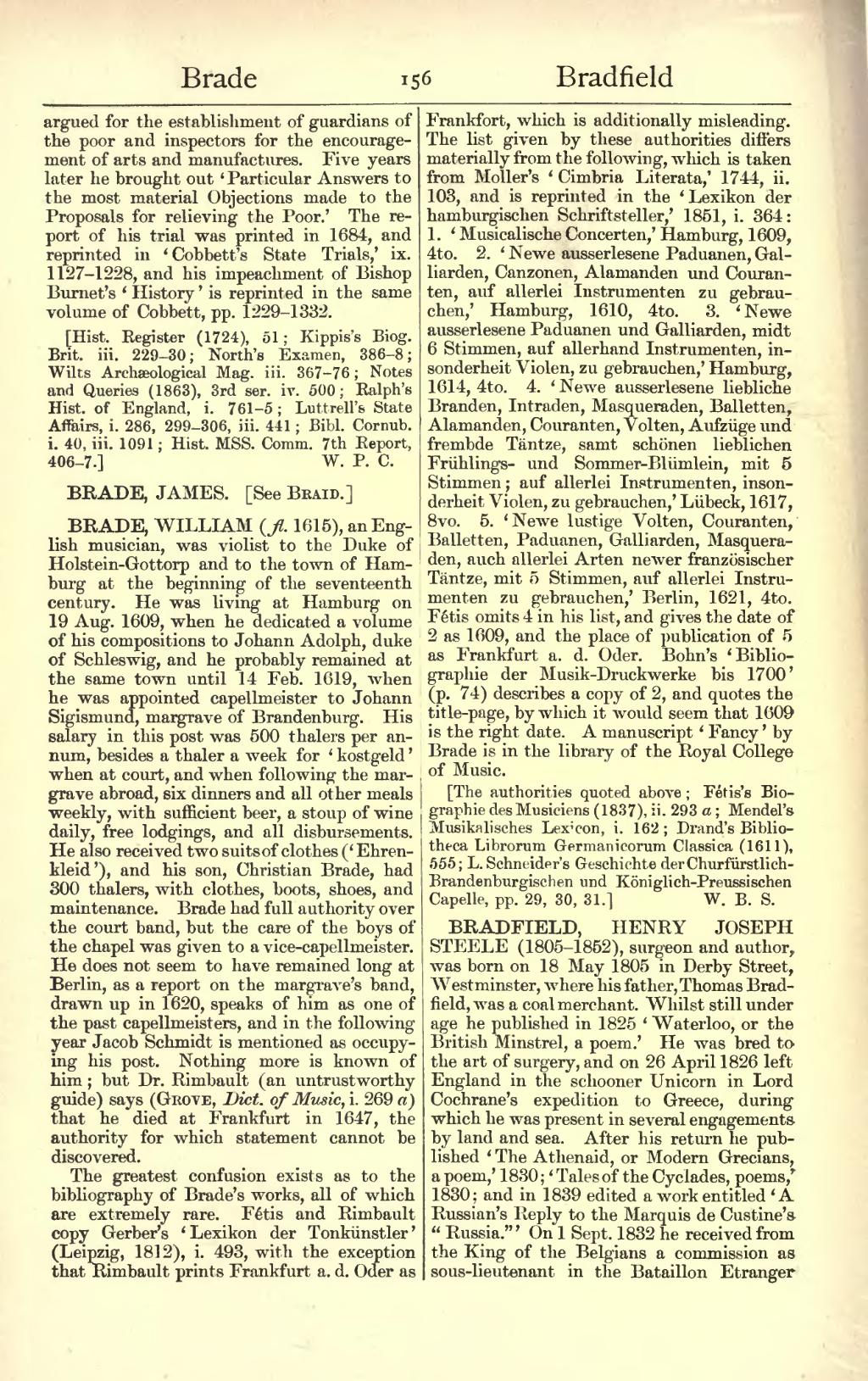argued for the establishment of guardians of the poor and inspectors for the encouragement of arts and manufactures. Five years later he brought out 'Particular Answers to the most material Objections made to the Proposals for relieving the Poor.' The report of his trial was printed in 1684, and reprinted in 'Cobbett's State Trials,' ix. 1127-1228, and his impeachment of Bishop Burnet's 'History' is reprinted in the same volume of Cobbett, pp. 1229-1332.
[Hist. Register (1724), 51; Kippis's Biog. Brit. iii. 229-30; North's Examen, 386-8; Wilts Archæological Mag. iii. 367-76; Notes and Queries (1863), 3rd ser. iv. 500; Ralph's Hist. of England, i. 761-5; Luttrell's State Affairs, i. 286, 299-306, iii. 441; Bibl. Cornub. i. 40, iii. 1091; Hist. MSS. Comm. 7th Report, 406-7.]
BRADE, JAMES. [See Braid.]
BRADE, WILLIAM (fl.. 1615), an English musician, was violist to the Duke of Holstein-Gottorp and to the town of Hamburg at the beginning of the seventeenth century. He was living at Hamburg on 19 Aug. 1609, when he dedicated a volume of his compositions to Johann Adolph, duke of Schleswig, and he probably remained at the same town until 14 Feb. 1619, when he was appointed capellmeister to Johann Sigismund, margrave of Brandenburg. His salary in this post was 500 thalers per annum, besides a thaler a week for 'kostgeld' when at court, and when following the margrave abroad, six dinners and all other meals weekly, with sufficient beer, a stoup of wine daily, free lodgings, and all disbursements. He also received two suits of clothes ('Ehrenkleid'), and his son, Christian Brade, had 300 thalers, with clothes, boots, shoes, and maintenance. Brade had full authority over the court band, but the care of the boys of the chapel was given to a vice-capellmeister. He does not seem to have remained long at Berlin, as a report on the margrave's band, drawn up in 1620, speaks of him as one of the past capellmeisters, and in the following year Jacob Schmidt is mentioned as occupying his post. Nothing more is known of him; but Dr. Rimbault (an untrustworthy guide) says (Grove, Dict. of Music, i. 269 a) that he died at Frankfurt in 1647, the authority for which statement cannot be discovered.
The greatest confusion exists as to the bibliography of Brade's works, all of which are extremely rare. Fétis and Rimbault copy Gerber's 'Lexikon der Tonkünstler' (Leipzig, 1812), i. 493, with the exception that Rimbault prints Frankfurt a. d. Oder as Frankfort, which is additionally misleading. The list given by these authorities differs materially from the following, which is taken from Moller's 'Cimbria Literata,' 1744, ii. 103, and is reprinted in the 'Lexikon der hamburgischen Schriftsteller,' 1851, i. 364: 1. 'Musicalische Concerten,' Hamburg, 1609, 4to. 2. 'Newe ausserlesene Paduanen, Galliarden, Canzonen, Alamanden und Couranten, auf allerlei Instrumenten zu gebrauchen,' Hamburg, 1610, 4to. 3. 'Newe ausserlesene Paduanen und Galliarden, midt 6 Stimmen, auf allerhand Instrumenten, insonderheit Violen, zu gebrauchen,' Hamburg, 1614, 4to. 4. 'Newe ausserlesene liebliche Branden, Intraden, Masqueraden, Balletten, Alamanden, Couranten, Volten, Aufzüge und frembde Tantze, samt schonen lieblichen Frühlings- und Sommer-Blümlein, mit 5 Stimmen; auf allerlei Instrumenten, insonderheit Violen, zu gebrauchen,' Lübeck, 1617, 8vo. 5. 'Newe lustige Volten, Couranten, Balletten, Paduanen, Galliarden, Masqueraden, auch allerlei Arten newer französischer Tantze, mit 5 Stimmen, auf allerlei Instrumenten zu gebrauchen,' Berlin, 1621, 4to. Fetis omits 4 in his list, and gives the date of 2 as 1609, and the place of publication of 5 as Frankfurt a. d. Oder. Bohn's 'Bibliographic der Musik-Druckwerke bis 1700' (p. 74) describes a copy of 2, and quotes the title-page, by which it would seem that 1609 is the right date. A manuscript 'Fancy' by Brade is in the library of the Royal College of Music.
[The authorities quoted above; Fétis's Biographie des Musiciens (1837), ii. 293 a; Mendel's Musikalisches Lexicon, i. 162; Brand's Bibliotheca Librorum German icorum Classica (1611), 555; L. Schneider's Geschichte der Churfürstlich Brandenburgischen und Koniglich-Preussischen Capelle, pp. 29, 30, 31.]
BRADFIELD, HENRY JOSEPH STEELE (1805–1852), surgeon and author, was born on 18 May 1805 in Derby Street, Westminster, where his father, Thomas Bradfield, was a coal merchant. Whilst still under age he published in 1825 'Waterloo, or the British Minstrel, a poem.' He was bred to the art of surgery, and on 26 April 1826 left England in the schooner Unicorn in Lord Cochrane's expedition to Greece, during which he was present in several engagements by land and sea. After his return he published 'The Athenaid, or Modern Grecians, a poem,' 1830; 'Tales of the Cyclades, poems,' 1830; and in 1839 edited a work entitled 'A Russian's Reply to the Marquis de Custine's "Russia."' On 1 Sept. 1832 he received from the King of the Belgians a commission as sous-lieutenant in the Bataillon Etranger
